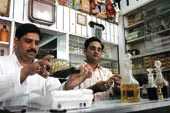 |
Even at the best of times, Rabindra Sarani and adjacent Colootola are not the most poetic of places. But the area was one of the last homes of the old, leisurely Awadhi culture, with a whiff of the old world lingering over its attar shops.
That smell, too, is changing. To keep up with the times, attarwallahs have started experimenting with chemical perfumes and blended attars. Most recently, they are creating their own versions of aqua perfumes in imitation of brands like Davidoff Cool Water.
A walk up and down Rabindra Sarani and Colootola reveals only two or three attar shops. The number of shops has declined over the years. Even five years ago, there was greater buzz in the area.
At Haji Khuda Bukhsh Nabi Bukhsh attar shop in Colootola (picture above by Bishwarup Dutta) which has , which has been there since 1824, the new creation Hiyati has the same fragrance as any aqua deo or perfume. For those who want the fragrance of attar without having to shell out so much, there are blended attars, perfumes that smell like rose or khus or musk, but are cheaper because they have a chemical or artificial base.
 |
“These blended attars are about 75 per cent cheaper than the original ones. Their demand is increasing by 50 per cent almost every year. But the demand for original attar is either stagnant or dropping by five per cent. Once the old lovers of attar die there will be no one to appreciate them,” says gray-haired Jamaluddin, whose family has owned the Taj attar shop in Rabindra Sarani for 135 years.
“Attar is much about taste, a certain way of life,” says Neyazuddin Allah Bukhsh, owner of the Haji Khuda Bukhsh Nabi Bukhsh attar shop.
“There is some demand during weddings and festivals, and some of the older men continue to ask for it, but otherwise there is little demand. There are few people today who come for attar,” says Jamaluddin.
“Many attar shops in the neighbourhood have closed down, and those who have survived have been forced to stock various deodorants and perfumes to draw customers,” he adds. Thirty years ago there were 50 shops, 10 four-five years back and now only two-three attar shops, according to Jamaluddin.
One shop in a neighbouring lane still has “perfumery” on the signboard, but has changed into a jewellery shop.
Another reason behind attar’s decline is its exorbitant price. “Chemical deodorants and perfumes are so much cheaper. Of course, a branded perfume is expensive, but there are so many available for Rs 50 to Rs 70. But attar, since it is natural and has a sandal oil base is expensive. Even 6 grams often cost Rs 200,” says Neyazuddin.
Preferences have also changed, with Davidoff Cool Water and Christian Dior or Brute being preferred to a rose or khus attar. Shops in malls speak of the growing perfume market in the city. Deos and sprays are more handy: they have stronger fragrances and last longer. For office-goers working long sweaty hours, these seem better options.
Attar-sellers talk about other lifestyle changes. “The fragrance of attar is usually long lasting. But because of chemical-rich food that we consume today, our sweat is very acidic. This reacts with the natural attar and causes the fragrance to fade,” says Jamaluddin.
Neyazuddin, who is younger, contemplates whether a trend like aroma therapy can be used to popularise attar again, but Jamaluddin sighs: “They do not use 100 per cent natural aromas. No, the age of attar has passed. After us our sons may completely change the shop into one for branded perfumes.”











